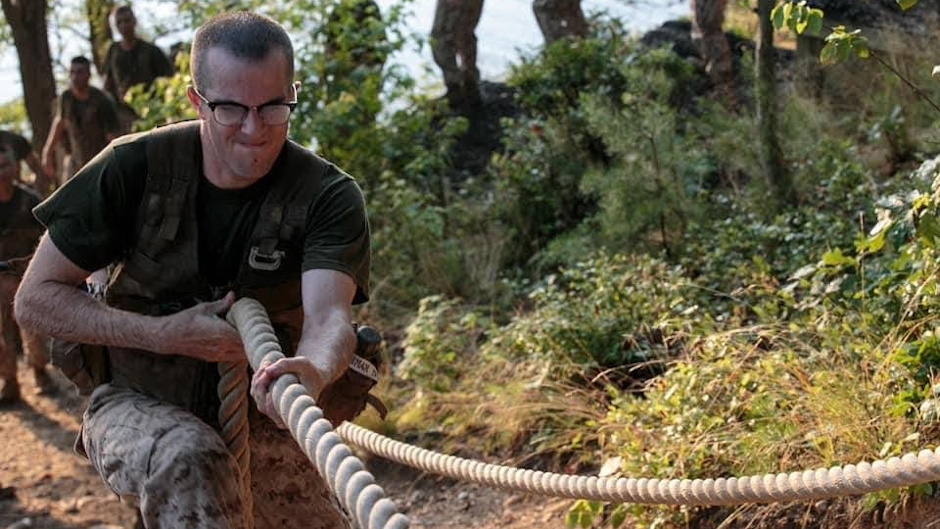Maxwell Zoberman can picture himself in the future prosecuting human rights offenses for the United States Department of Justice. In the meantime, he has a whole lot of training and experience to keep him busy. Very busy.
The Miami Public Interest Scholar spent a grueling ten weeks during his rising 3L summer in Quantico, Virginia, at the U.S. Marine Corps (USMC) Officer Candidates School, the training regimen designed to screen and evaluate potential Marine Corps officers, graduating as a commissioned second lieutenant and student judge advocate in the USMC.
"OCS was the most fun I would never want to have again," said the third-year Miami Law student. "It was far more of a mental and emotional test of will and character than it was a physical gauntlet. It teaches you how to become comfortable being profoundly uncomfortable and how to be strategically sound amidst chaos and stress. You practice handling difficult interpersonal interactions, managing frustration, and leading peers. Almost every one of those things is directly transferable to law school and the practice of law."
At Miami Law, the 26-year-old Delray Beach, Florida, native has made the dean's list and been honored as Dean's Fellow in civil procedure and constitutional law, and participated in the Florida Pro Bono Law School Challenge and on Miami Law’s Trial Team.
As a student-attorney, he engages in clinical training with systems-level advocacy concerning gender-based violence in South Florida and, particularly, the effect of the ongoing COVID-19 pandemic on affected populations for the Human Rights Clinic.
"The Human Rights Clinic allows me to specialize in an area that's particularly meaningful to me – gender-based violence – which reinforces my work as a certified legal intern with the domestic violence unit and the Miami-Dade County State Attorney's Office," the J.D./LL.M. in International Law 2022 candidate said.
He also served as a law research assistant to Professor Martha Mahoney and M. Minnette Massey Professor of Law and Dean Emeritus Anthony Varona, preparing research outlines, drafting memoranda, and assisting in editing work regarding Florida drug-possession statutes, federal protections for LGBTQ Americans under the Bostock v. Clayton County, Georgia, decision.
The Road to Service
Zoberman comes from a family of attorneys (his parents are attorneys, and his brother is a law school graduate) and always knew he wanted to follow that path eventually after spending some time competing on his college mock trial team at Emory University, where he graduated with a dual degree in political science and Spanish.
While at Emory, he served as a trial investigative intern at the Public Defender's Office-15th Judicial Circuit of Florida West, where he conducted evidence development in strategic preparation for trial and participated in arraignments and pre-trial client interviews at the county jail to support the assigned public defender in the felony division, often working as a Spanish-English translator.
"I wanted to design a career that put me in as many service-oriented positions as possible and still do," he said. "Before I graduated – and after I had already been accepted by law schools – I was approached by Teach for America and the Corps. Both recruiters made a strong pitch that their organizations would offer me the opportunity to serve meaningfully.”
Service also runs in his family: On his matriarchal side, his great-grandfather fought in World War I, and a great-uncle was a bomber pilot in World War II. On the patriarchal side, his grandfather was in the Polish Mountain Artillery, and his grandmother was a Holocaust survivor of Auschwitz.
A Change in Direction
"The recruiters upended my plans, I withdrew my law school applications, took a few years to teach high school Spanish in South Atlanta for TFA, and then came to law school while applying to Officer Candidate School," he said.
Zoberman says that he knew he wanted to serve as early as high school, but the dream faded somewhat when he chose to pursue his undergraduate degree and aspirations of becoming an attorney. "It wasn't until being approached by a recruiter that I felt the call to serve in uniform again," he said.
He landed at Miami Law, he says, "because of its strong emphasis on, and investment in, public interest and litigation skills. The missions of Dean Marni Lennon and the HOPE Program deeply resonated with me, and the opportunity to learn from adjunct faculty who are currently "in the arena" how to navigate a courtroom was too exciting to pass up. Both opportunities have proven to be more valuable than I knew when I applied."
Next Steps
With his May 2022 graduation looming, Zoberman turns his attention toward the bar exam and successful completion of his degree program before heading out to the U.S. Marine Corps Basic School, where he will learn to operate as a provisional rifle platoon commander, immediately followed by Naval Justice School and on to a permanent duty station.
"I'm looking forward to serving Corps and Country and using my legal training here at UM to do it," he said. "Then who knows? Ultimately, I'd like to prosecute human trafficking offenses for the Department of Justice. But that's a long way off. At the moment, I'm focused on being the best leader of Marines and the most effective trial advocate possible. We'll see where that takes me."
Read more about litigation, arbitration and disputer resolution
Read more about the HOPE Public Interest Resource Center

